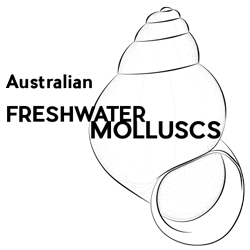
Species in the B. bellii group are small to medium-sized (2.3-3.0 mm in length), ovate-conic to ovate and usually have a columellar swelling. The penis is simple (as in B. belli and B protuberata) or with a lenticular brown gland in the middle. Species in this group are restricted to north-western Tasmania.
This species is one of five species that form a very distinct and apomorphic group, the other species being B. topsiae, B. salmonis, B, gibba and B. fultoni [1] [2][1] [2]. All but one (B. fultoni [1] [2][1] [2]) have a columellar fold on the rather broadly conic to ovate-conic shell, but the most distinctive feature is the presence of a large brown gland on the convex part of the medial section of the penis.B. mesibovi can be distinguished from the other members of the subgroup by the ventral channel of the capsule gland lacking an anterior vestibule and having a terminal genital opening.
Beddomeia mesibovi Ponder & Clark, 1993
Class Gastropoda
Infraclass Caenogastropoda
Order Littorinida
Suborder Rissoidina
Superfamily Truncatelloidea
Family Beddomeiidae
Original name: Beddomeia mesibovi Ponder & Clark, 1993. In Ponder, W.F., Clark, G.A., Miller, A. & Toluzzi, A. (1993). On a major radiation of freshwater snails in Tasmania and eastern Victoria - a preliminary overview of the Beddomeia group (Mollusca: Gastropoda: Hydrobiidae). Invertebrate Taxonomy, 7: 501-750.
Type locality: Small stream S of Arthur River near Kanunnah Bridge, Tasmania (41°07'S 144°58'04"E).
On leaf litter and moss and under wood and rocks in streams. Egg capsules like those of other Beddomeia species (Karen Richards pers. comm.) - dome-shaped, with broad attachment base, covered with minute, mainly white sand grains and other fragments and containing a single egg. Development direct.
This species is only known from a few small streams south of Arthur River, Tasmania.
All species of Beddomeia are geographically isolated and have restricted ranges.
This species is on the Tasmanian Threatened Species Protection Act 1995 as Rare (small population at risk).
Ponder, W. F., Clark, G. A., Miller, A. C. & Toluzzi, A. (1993). On a major radiation of freshwater snails in Tasmania and eastern Victoria: a preliminary overview of the Beddomeia group (Mollusca: Gastropoda: Hydrobiidae). Invertebrate Taxonomy 7: 501-750.